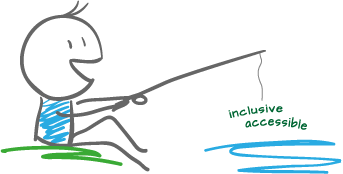About the Author

Should you use the new accessibilitly tags in your PDFs?
No.
Here's why...
The standard is too new and not ready for use.
Sure, it adds new accessibility tags to our documents, but they're not yet recognized by screen readers and other assistive technologies.
That means if those tags are used in your PDF, they'll be voiced or presented as plain body text. And that could be very detrimental to the user's experience.
For screen reader users, this is very UNhelpful for at least 2 of the new tags — <Title> and <Artifact>.
In our testing with screen readers, when <Title> is used instead of the traditional <H1> Heading 1 tag, it isn't identified by screen readers and instead is voiced as if it's body text.
This doesn't clue screen reader users that there is a title in the document, nor what text is in the title. Users will have to infer the title from the jumble of words they hear. For many documents, the title text is not obvious when it's mixed in with body text and part of the word-soup that streams through a user's earbuds.
<Title> will be very useful — WHEN screen reader software is programmed to recognize and announce it to users.
We'll keep testing with the 2 main screen readers, JAWS and NVDA, and let our subscribers and clients know when the <Title> tag is ready to use.
 But until then, keep using <H1> for the titles of your PDF documents until you hear from us.
But until then, keep using <H1> for the titles of your PDF documents until you hear from us.
This is a hairbrained idea from the PDF/UA standards committee.
Traditionally, artifacting unimportant elements (like borders, underlines, and unnecessary graphics) is done by putting an artifact attribute on a tag. Assistive technologies recognize the attribute and skip voicing or presenting it to their users. Remediators also don't see the element's tag in the PDF's tag tree, either.
But this new <Artifact> Tag creates an entirely different experience that is a nightmare for both screen reader users and remediators.
The reasons the PDF committee has given for adding the <Artifact> tag are not valid enough to warrent making a more complex, cluttered tag tree, especially for elements that are visual "fluff" and don't convey valuable visible information. The committee's reasons could have been accomplished with other tags, attributes, or structure elements.
We don't believe these tags were vetted and tested thoroughly enough before being built into the new standard.
 To correct PDFs that have <Artifact> tags, rename the tags either <P> or <Figure> and artifact them with the traditional method:
To correct PDFs that have <Artifact> tags, rename the tags either <P> or <Figure> and artifact them with the traditional method:
Hopefully, assistive technologies, especially screen readers, will tweak their software to recognize these new tags and process them correctly for their end users.
But without a crystal ball, we don't have any idea if or when that will happen. The companies have a history of lagging behind in making their tools work better with PDF files.
So don't hold your breath for them to change, and I sure hope we're wrong about the timeline!
We'll keep you posted on this development.
Our services help you maximize your technology, streamline your workflow, and seamlessly build accessibility into your digital publications. Our mission is to train and coach you so well that you no longer need us or outside remediation services.
By teaching you how to fish — and make accessible PDFs right out of the box — we hope to work ourselves out of our jobs!
PubCom has a full suite of courses on accessibility topics, as well as traditional desktop publishing, digital media, and website development. We started offering accessibility training to the federal government in 2001 right after Section 508 and WCAG 1.0 went into effect in the US. That was 23+ years ago and we haven't stopped yet!
The takeaway: we know publishing, from editorial to design to distribution (print and digital) — and we're accessibility experts (Bevi Chagnon is a delegate to the ISO committee for PDF accessibility that creates the PDF/UA standard). We share our knowledge and help you learn to fish. Our little fisherman keeps us on our goal.

 Drop us a line and let us know how we can help.
Drop us a line and let us know how we can help.